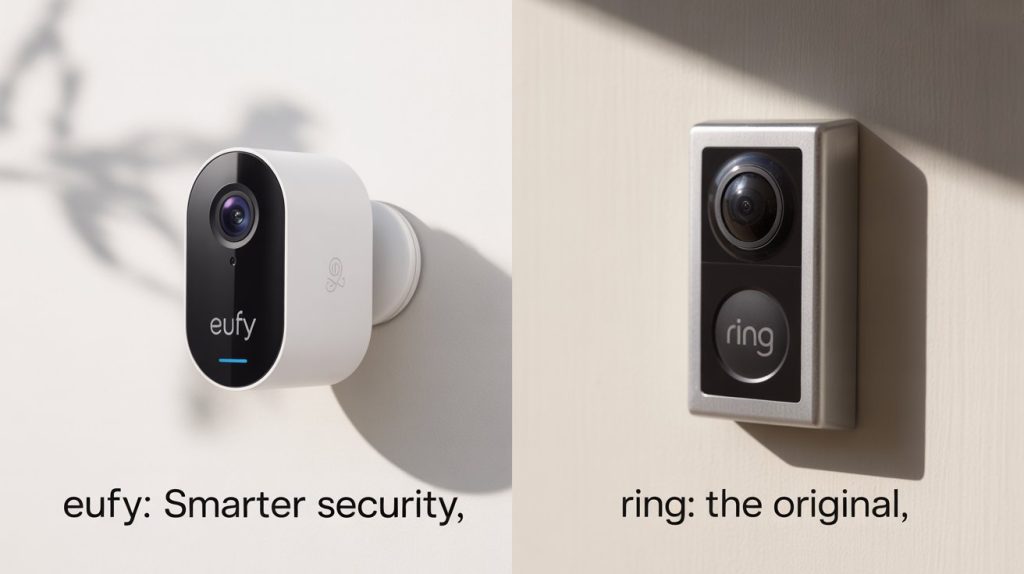Eufy vs. Ring – Which Home Security System is Right for You?
When it comes to safeguarding your home, choosing the right security system is a top priority. Two brands that consistently dominate the market are Eufy and Ring. Both offer a range of smart security devices, including video doorbells, indoor and outdoor cameras, and comprehensive home alarm systems. But which one is the better fit for your needs? In this in-depth comparison, we’ll explore Eufy vs. Ring, breaking down their features, performance, pricing, privacy policies, and more to help you make an informed decision.
With home security becoming increasingly accessible thanks to smart technology, Eufy and Ring have emerged as household names. Eufy, a sub-brand of Anker Innovations, is known for its subscription-free model and high-resolution cameras. Ring, owned by Amazon since 2018, offers a robust ecosystem with seamless integration into Amazon’s smart home platform. Both brands cater to homeowners looking for reliable, user-friendly security solutions, but their approaches differ significantly.
This blog post will dive into the nitty-gritty of Eufy and Ring, comparing their products, installation processes, video quality, storage options, smart home compatibility, and customer support. We’ll also address privacy concerns, a critical factor in today’s connected world. By the end, you’ll have a clear understanding of which brand aligns with your security needs and budget. Plus, we’ve included nine frequently asked questions to cover any lingering doubts.
Overview of Eufy and Ring
Eufy: Smart Home Simplified
Eufy, launched by Anker Innovations, focuses on delivering smart home devices that are easy to use and don’t require ongoing subscriptions. The brand’s motto, “Smart Home Simplified,” reflects its commitment to user-friendly design and privacy-centric features. Eufy’s product lineup includes video doorbells, indoor and outdoor cameras, floodlight cameras, smart locks, and customizable home security systems.
Eufy stands out for its local storage options, allowing users to save video footage on a microSD card or a HomeBase hub without relying on cloud services. Many of its cameras boast 2K resolution, facial recognition, and AI-powered motion detection. However, Eufy has faced criticism in the past for privacy issues, particularly a 2022 security breach that raised concerns about its parent company’s ties to China. The company has since addressed these issues, but it’s worth considering when evaluating the brand.
Ring: Amazon’s Security Powerhouse
Ring, acquired by Amazon in 2018, revolutionized home security with its affordable video doorbells and cameras. The brand is synonymous with smart doorbells, capturing everything from package deliveries to neighborhood antics. Ring’s product range includes video doorbells, indoor and outdoor cameras, floodlight cameras, and the Ring Alarm system, which offers professional monitoring.
Ring’s strength lies in its integration with Amazon’s ecosystem, particularly Alexa, making it a go-to choice for users already invested in Amazon devices. However, Ring requires a subscription for most advanced features, including video recording and storage. The brand has also faced scrutiny over privacy concerns, including partnerships with local police and past hacking incidents. Despite these challenges, Ring remains a popular choice for its reliability and extensive product catalog.
Key Features Comparison
Let’s break down the core aspects of Eufy and Ring to see how they stack up against each other.
1. Product Range
Both Eufy and Ring offer a variety of devices to secure your home, but their product catalogs differ in scope and specialization.
- Eufy: Eufy’s lineup is diverse, covering video doorbells (wired and battery-powered), indoor and outdoor cameras, floodlight cameras, smart locks, and home security systems. Unique offerings include cameras with built-in outdoor lights, garage door opener cameras, and smart lock-video doorbell combos. Eufy’s systems are modular, allowing users to add components like motion sensors and entry sensors as needed. The HomeBase hub serves as a central control unit for many devices, enhancing functionality and storage.
- Ring: Ring boasts a broader selection, particularly in video doorbells, with nine models ranging from budget-friendly wired options to premium battery-powered units. Its camera lineup includes indoor, outdoor, spotlight, and floodlight models. The Ring Alarm system, available in classic and Pro versions, integrates with Z-Wave devices for expandability. Ring also offers accessories like keypads, solar panels, and custom chimes, giving users more customization options.
Verdict: Ring wins for its extensive product range and accessory ecosystem, making it ideal for users who want a one-stop-shop for home security. Eufy’s offerings are more specialized, appealing to those who prioritize unique features like smart lock integration.
2. Video Quality
Video clarity is a critical factor for security cameras, as it determines how well you can identify faces or license plates.
- Eufy: Eufy cameras typically record in 2K resolution (2560×1920), offering sharper and more detailed footage than standard 1080p. Some models, like the Floodlight Camera E340, feature dual 2K and 3K lenses for enhanced clarity and zoom capabilities. Eufy’s cameras also include Wide Dynamic Range (WDR) to handle bright and shadowy conditions, ensuring clear images in various lighting scenarios. Night vision is robust, with some models offering color capture at night, an industry first.
- Ring: Most Ring cameras record in 1080p, which is sufficient for general surveillance but falls short of Eufy’s clarity. Newer models, like the Ring Video Doorbell Pro 2, support 1536p, closing the gap slightly. Ring’s night vision is reliable but primarily monochrome, lacking the color night vision found in some Eufy models. Ring cameras perform well in standard conditions but may struggle with high-contrast scenes due to limited dynamic range.
Verdict: Eufy takes the lead with superior 2K resolution and advanced features like color night vision, making it the better choice for users who prioritize video clarity.
3. Storage Options
How and where your video footage is stored impacts both cost and privacy.
- Eufy: Eufy emphasizes local storage, allowing users to save footage on a microSD card (up to 128GB) or a HomeBase hub, which can support up to 16TB with an external hard drive. This eliminates the need for a subscription, as core features like motion detection and facial recognition work without cloud access. Eufy also offers optional cloud storage starting at $2.99 per month for users who prefer remote access. Network-attached storage (NAS) connectivity is available on some models, enhancing long-term storage options.
- Ring: Ring relies heavily on cloud storage, requiring a subscription to save and review video clips. The Basic Plan ($3.99/month or $39.99/year) covers one device with 180 days of video history, while the Plus Plan ($10/month or $100/year) supports multiple devices. Without a subscription, Ring devices are limited to live streaming and motion alerts, significantly reducing functionality. Ring does not offer local storage, which may concern privacy-conscious users.
Verdict: Eufy is the clear winner for its subscription-free local storage and flexible options, ideal for those who want to avoid recurring fees. Ring’s cloud-only model is convenient but costly over time.
4. Subscription Costs
Subscriptions can significantly affect the long-term cost of a security system.
- Eufy: Eufy’s biggest selling point is that most features, including video recording and AI detection, are available without a subscription. The HomeBase hub or microSD card handles storage, keeping costs low. For users who want cloud backup, Eufy offers the Basic Plan ($4.99/month or $49.99/year) and the Plus Plan ($9.99/month or $99.99/year), which includes professional monitoring and advanced features. These plans are optional, giving users flexibility.
- Ring: Ring’s functionality is heavily tied to its subscription plans. The Basic Plan ($3.99/month or $39.99/year) provides 180 days of video history for one device. The Plus Plan ($10/month or $100/year) covers unlimited devices and adds an extended warranty. The Pro Plan ($20/month or $200/year) includes professional monitoring and 24/7 backup. Without a subscription, Ring devices lose much of their value, as video recording and playback are unavailable.
Verdict: Eufy’s subscription-free model is a major advantage for budget-conscious users. Ring’s plans are affordable but mandatory for full functionality, making Eufy the more cost-effective choice long-term.
5. Smart Home Integration
Compatibility with smart home platforms enhances convenience and automation.
- Eufy: Eufy supports Amazon Alexa and Google Assistant, allowing voice control and integration with smart displays. However, its compatibility is limited compared to Ring, and some users report issues with third-party platforms like HomeKit. Eufy’s HomeBase hub acts as a central controller, but its ecosystem is less expansive than Ring’s.
- Ring: As an Amazon-owned brand, Ring integrates seamlessly with Alexa, enabling voice commands, live feeds on Echo Show devices, and automation with other Amazon products. Ring also supports IFTTT and Z-Wave for broader connectivity. However, integration with Google Assistant and HomeKit is limited or nonexistent, which may disappoint users outside the Amazon ecosystem.
Verdict: Ring excels in smart home integration, particularly for Alexa users. Eufy’s compatibility is solid but less comprehensive, making Ring the better choice for Amazon-centric households.
6. Installation
Ease of setup is crucial, especially for DIY enthusiasts.
- Eufy: Eufy devices are designed for straightforward DIY installation. Battery-powered models, like the Eufy Video Doorbell, require no wiring, while wired options are compatible with existing doorbell systems. The Eufy Security app guides users through setup, and mounting hardware is included. Some cameras, like the Floodlight Camera E340, may require more effort due to their size and wiring needs, but overall, installation is user-friendly.
- Ring: Ring also prioritizes DIY installation, with clear instructions in the Ring Home app. Battery-powered devices are simple to mount, and wired models work with standard doorbell wiring. Ring’s floodlight cameras have a flexible mounting system, making them easier to install than Eufy’s bulkier equivalents. Ring Chime accessories can be added without a hub, simplifying setup compared to Eufy’s HomeBase-dependent models.
Verdict: Both brands offer easy installation, but Ring edges out slightly due to its more flexible mounting options and hub-free setup for some devices.
7. Privacy and Security
Privacy is a major concern for smart security devices, given their access to sensitive footage.
- Eufy: Eufy promotes privacy with local storage and end-to-end encryption, ensuring footage stays on your device or HomeBase. However, a 2022 security breach exposed vulnerabilities, and Eufy’s initial claims about encryption were found to be misleading. The company has since improved transparency and security measures, but its ties to Anker, a Chinese company, may still raise concerns for some users.
- Ring: Ring has faced significant privacy controversies, including partnerships with law enforcement that allowed police to request footage without user consent (now discontinued). Hacking incidents and employee misconduct have also tarnished its reputation. Ring uses encryption and two-factor authentication, but its cloud-only storage means Amazon has access to your data, which may worry privacy advocates.
Verdict: Eufy has the edge for privacy due to its local storage and subscription-free model, despite past issues. Ring’s cloud reliance and history of controversies make it less appealing for privacy-conscious users.
8. Performance and Reliability
A security system must be dependable to provide peace of mind.
- Eufy: Eufy cameras are praised for their accurate motion detection, with AI features like facial recognition and human-only modes reducing false alerts. Battery life is impressive, lasting 4-6 months on a single charge for most devices. However, some users report lag in the Eufy Security app, particularly with live streaming and two-way audio. The HomeBase hub improves performance but adds to the cost.
- Ring: Ring’s motion detection is reliable, with customizable zones to minimize false triggers. Its app is polished, offering a timeline view for easy video navigation. Battery life is shorter than Eufy’s, typically lasting 1-2 months, and connectivity issues have been reported in areas with weak Wi-Fi. Ring’s cloud-based system ensures consistent performance but depends on a stable internet connection.
Verdict: Eufy wins for battery life and AI-driven performance, but Ring’s app is more user-friendly and reliable for cloud-based features. The choice depends on whether you prioritize local processing or app polish.
9. Customer Support and Warranty
Responsive support and warranty coverage are essential for long-term satisfaction.
- Eufy: Eufy offers a one-year warranty on most devices, with some models including a 30-day money-back guarantee. Customer support is available via email, phone, and online chat, but response times can be inconsistent. The Eufy community forum provides additional resources, but some users report challenges resolving complex issues.
- Ring: Ring provides a one-year warranty, extendable with the Plus or Pro subscription plans. Support is accessible through phone, email, and live chat, with a reputation for being responsive. Ring’s website offers extensive guides and FAQs, and its integration with Amazon’s ecosystem ensures robust after-sales support. Ring also offers lifetime theft protection, replacing stolen devices for free.
Verdict: Ring has better customer support and added perks like theft protection, making it the stronger option for after-sales service.
Real-World Scenarios: Which Brand Suits Your Needs?
To help you decide, let’s explore how Eufy and Ring perform in common use cases.
- Budget-Conscious Homeowner: If you want to avoid recurring costs, Eufy is the better choice. Its subscription-free model and local storage keep expenses low, and mid-range cameras like the EufyCam E220 ($135) offer excellent value. A HomeBase hub ($100) may be required for some devices, but it’s a one-time cost. Ring’s subscriptions add up over time, with even the Basic Plan costing $39.99/year per device.
- Amazon Smart Home User: Ring is the go-to for households with Alexa devices. Its seamless integration with Echo Show, Fire TV, and other Amazon products makes it a natural fit. For example, you can view live feeds on your Echo Show with a simple voice command. Eufy’s Alexa support is functional but less polished, and it lacks the deep ecosystem Ring offers.
- Privacy-Focused User: Eufy’s local storage and encryption make it the safer bet for privacy. You can store footage on a HomeBase or microSD card, minimizing reliance on external servers. Ring’s cloud storage and past privacy scandals make it less appealing for those wary of data exposure.
- Apartment Dweller: For renters or those in smaller spaces, both brands offer battery-powered devices that don’t require wiring. Eufy’s Video Doorbell Battery ($129.99) is subscription-free, while Ring’s Video Doorbell ($99.99) is cheaper upfront but requires a subscription for recording. Eufy’s compact design and local storage may be more practical for apartments.
- Large Property Owner: Ring’s broader product range and professional monitoring make it better for large homes. The Ring Alarm Pro, with its built-in Wi-Fi 6 router, ensures coverage for expansive properties. Eufy’s modular system is flexible but lacks the same level of integration and monitoring options.
Pros and Cons Summary
Eufy
Pros:
- Subscription-free local storage
- Superior 2K video quality
- Long battery life (4-6 months)
- AI features like facial recognition
- End-to-end encryption for privacy
Cons:
- Limited smart home integration
- App can be laggy
- Past privacy concerns
- Some devices require HomeBase hub
Ring
Pros:
- Extensive product range
- Seamless Alexa integration
- Polished app with timeline view
- Professional monitoring options
- Lifetime theft protection
Cons:
- Mandatory subscriptions for recording
- Lower video quality (mostly 1080p)
- Shorter battery life (1-2 months)
- Privacy controversies
- Cloud-only storage
Final Verdict: Eufy vs. Ring
Choosing between Eufy and Ring depends on your priorities. If you value cost savings, privacy, and high-resolution video, Eufy is the better option. Its subscription-free model, local storage, and 2K cameras make it a compelling choice for budget-conscious users who want control over their data. The Eufy Video Doorbell and Floodlight Camera E340 are standout products for their clarity and versatility.
On the other hand, if you’re invested in Amazon’s ecosystem, prefer a wider product range, or want professional monitoring, Ring is the way to go. Its seamless Alexa integration, extensive device catalog, and reliable app make it ideal for users who don’t mind paying for subscriptions. The Ring Video Doorbell Pro 2 and Ring Alarm Pro are excellent choices for comprehensive security.
Ultimately, both brands deliver reliable home security, but Eufy excels for those seeking a one-time investment, while Ring is better for integrated smart home setups. Consider your budget, smart home preferences, and privacy concerns to make the right choice.
9 Frequently Asked Questions
- Do Eufy and Ring require a subscription?
Eufy does not require a subscription for core features like video recording, as it supports local storage via a microSD card or HomeBase. Ring requires a subscription (starting at $3.99/month) for video recording and playback, as it relies on cloud storage. - Which brand offers better video quality?
Eufy generally offers better video quality with 2K resolution across most cameras, compared to Ring’s standard 1080p. Some Ring models, like the Video Doorbell Pro 2, support 1536p, but Eufy’s clarity is superior overall. - Can I use Eufy or Ring without Wi-Fi?
Both brands require Wi-Fi for full functionality, including live streaming and app access. Eufy’s local storage allows offline recording, but you’ll need internet to view footage remotely. Ring’s cloud-based system is entirely dependent on Wi-Fi. - Are Eufy and Ring compatible with Alexa?
Yes, both support Alexa, but Ring’s integration is more seamless due to its Amazon ownership. You can view live feeds and control Ring devices on Echo Show devices effortlessly. Eufy’s Alexa but may require additional setup. - How long do the batteries last?
Eufy’s battery-powered devices typically last 4-6 months on a single charge, depending on usage. Ring’s batteries last 1-2 months, requiring more frequent recharging or a wired setup for consistent power. - Which is more privacy-friendly?
Eufy is more privacy-friendly due to its local storage and end-to-end encryption, reducing reliance on cloud servers. Ring’s cloud storage and past privacy issues make it less secure option, though it uses encryption and two-factor authentication. - Can I install Eufy or Ring devices myself?
Both Eufy and Ring are designed for easy DIY installation, with battery-powered options requiring no wiring. Wired models may need basic electrical knowledge, but both brands provide clear instructions and mounting hardware. - What happens if my Eufy or Ring device is stolen?
Ring offers lifetime theft protection, replacing stolen devices for free with proper documentation. Eufy does not have a similar program, so you’d need to replace stolen devices at your own cost. - Which brand has better customer support?
Ring generally has better customer support, with faster response times and extensive online resources. Eufy’s support is adequate but can be slower, though its community forum offers additional help.
Conclusion
Eufy and Ring are both excellent choices for home security, each catering to different needs. Eufy shines with its subscription-free model, high-quality video, and privacy-focused features, making it ideal for those who want a cost-effective, standalone system. Ring stands out for its Amazon integration, broad product range, and professional monitoring, perfect for users seeking a connected smart home experience.
By weighing factors like video quality, storage options, smart home compatibility, and privacy, you can choose the brand that best fits your lifestyle. Whether you opt for Eufy’s local storage or Ring’s cloud-based convenience, both brands offer peace of mind in protecting what matters most—your home.





